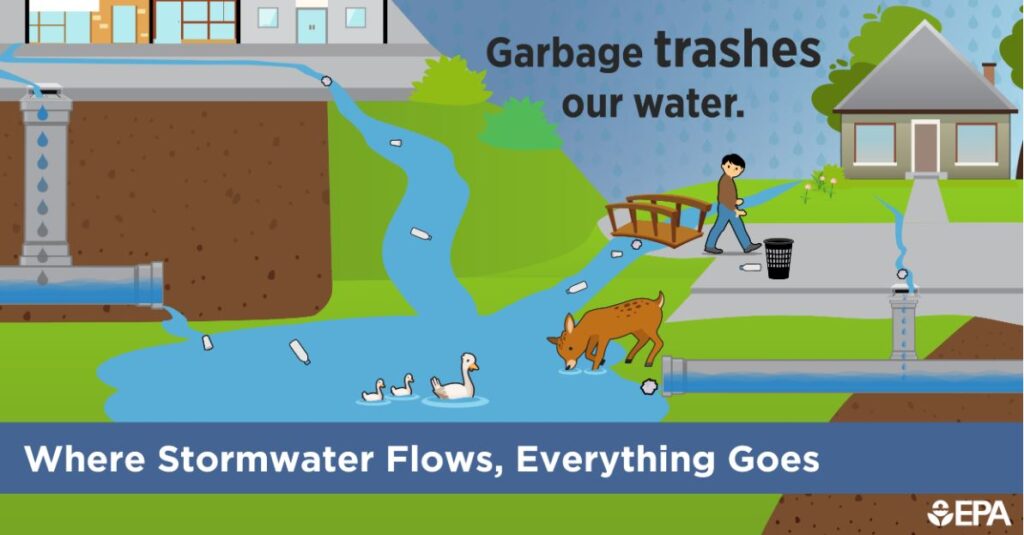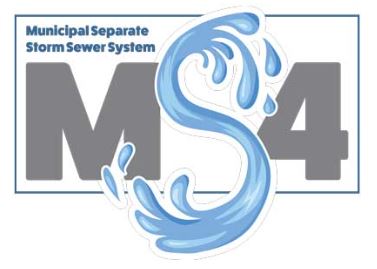

 Protecting our Waterways Together
Protecting our Waterways Together
Stormwater Management in North Coventry Township
As part of our commitment to protecting the environment and complying with state and federal regulations, our Township participates in the Municipal Separate Storm Sewer System (MS4) program, which helps reduce pollution in our local waterways caused by stormwater runoff.
What is MS4?
The MS4 program is a federally mandated initiative regulated by the Environmental Protection Agency (EPA) under the Clean Water Act and administered by the Pennsylvania Department of Environmental Protection (PA DEP). The program focuses on managing stormwater discharges from our separate storm sewer system to ensure that pollutants are minimized before reaching our streams, rivers, and lakes.
Why is Stormwater a Concern?
When it rains, water flows over rooftops, streets, lawns, and other surfaces, picking up pollutants like oil, pesticides, fertilizers, trash, and sediment. This polluted runoff flows into storm drains and eventually ends up in our local waterways—untreated.
Unlike water that enters the sanitary sewer system (which goes to a treatment plant), stormwater runoff goes directly into our creeks and rivers. That’s why it’s critical to manage stormwater properly.
MS4 Program Goals
Under the MS4 program, North Coventry Township implements six Minimum Control Measures (MCMs):
- Public Education and Outreach
Informing residents and businesses about the impacts of stormwater pollution and how they can help. - Public Involvement and Participation
Encouraging the community to take part in cleanup events, meetings, and stormwater-related initiatives. - Illicit Discharge Detection and Elimination (IDDE)
Identifying and eliminating unauthorized discharges into the storm sewer system. - Construction Site Runoff Control
Ensuring that construction sites implement erosion and sediment controls to prevent runoff. - Post-Construction Stormwater Management
Requiring long-term stormwater management practices in new developments and redevelopments. - Pollution Prevention/Good Housekeeping
Promoting best practices in municipal operations to reduce stormwater pollution.
How You Can Help
- Never dump anything into storm drains. Only rain belongs in the drain!
- Use fertilizers and pesticides sparingly. Excess chemicals wash into our streams.
- Pick up after your pets. Pet waste contains harmful bacteria.
- Properly dispose of motor oil, paint, and other household chemicals.
- Plant trees and use rain gardens. They help absorb rainwater and reduce runoff.
- Report illegal discharges or suspicious activity to our Public Works Department.
Report a Stormwater Concern
If you observe illegal dumping, clogged storm drains, or signs of pollution, please contact:
📞 Township Administration at 610-323-1694
📧 admin@northcoventry.us
📍 Link to Illicit Discharge Reporting Form
Stay Informed
Check back regularly for updates on our MS4 permit, public involvement opportunities, and ways you can contribute to cleaner water in our community.
Agency Resources Available to you
- PA-DEP’s Stormwater Management Program
- PA-DEP’s Best Management Practices (BMP) Manual
- U.S. Environmental Protection Agency’s Stormwater Discharges from Municipal Systems (About the MS4 Program)
- Stormwater PA
- Center for Watershed Protection
- Stormwater Resources (The Stormwater Manager’s Resource Center)
- Stormwater – The Journal of Surface Water Quality Professionals
- A Homeowner’s Guide to Stormwater Management
- Stormwater Basins Retrofits (PA PEC) and Interactive Basin Retrofit Resource
How to Report An Illicit Discharge
What is an illicit discharge? An illicit discharge is defined as any discharge to an MS4 (Municipal Separate Storm Sewer System) that is not composed entirely of stormwater (with some exceptions). Illicit discharges are considered “illicit” because MS4s are not designed to accept, process, or discharge such non–storm water wastes. Sources of illicit discharges can include sanitary wastewater, effluent from septic tanks, improper oil disposal, laundry wastewater, spills from roadway accidents, or improper disposal of auto and household toxins. Illicit discharges enter the system through either direct connection, (wastewater piping either mistakenly or deliberately connected to the storm drains) or indirect connections (infiltration into the MS4 from sanitary systems, spills collected by drain outlets, paint or used oil dumped directly into a drain). The result is untreated discharges that contribute high levels of pollutants, including heavy metals, toxins, oil and grease, solvents, nutrients, viruses, and bacteria to receiving water bodies. Pollutant levels from these illicit discharges have been shown in EPA studies to be high enough to significantly degrade receiving water quality and threaten aquatic, wildlife, and human health. Not all discharges are illicit, including water line flushing, foundation drains, springs, air conditioning condensation, flows from wetlands, etc. For more information on illicit discharges and report potential discharges please refer to the Township’s Report Form for Illicit Discharges below.

